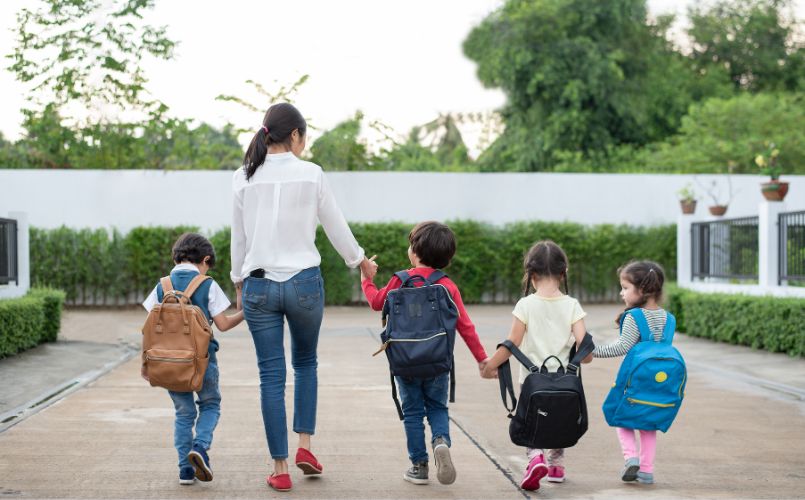Such feelings are common, especially after a long summer vacation. Students stepping into the new class often experience an elevated level of stress due to the increased academic pressure.
Back-to-school anxiety isn’t something to be brushed aside; it’s a real concern that demands attention. The first step towards this is understanding the cause. It could stem from worries about fitting in socially or about coping with the academic rigor. Recognising these fears can make a big difference.
As parents, you can help your child by initiating open conversations about their concerns. A simple dialogue can do wonders in alleviating their fears. Remember, your role is to guide and provide reassurance, not necessarily to solve all problems.
It’s also important to establish routines before school reopens. Having a regular sleep and study schedule can greatly reduce anxiety. Visit the school together if possible or meet the new teacher virtually, to familiarize your child with the upcoming changes.
Engage in activities that boost your child’s confidence. Whether it’s participating in a hobby class or practicing a new sport, yoga these efforts will help them develop resilience and adaptability.
 Moreover, consider seeking professional help if the anxiety persists. School counselors and psychologists are trained to deal with such issues and can provide effective strategies.
Moreover, consider seeking professional help if the anxiety persists. School counselors and psychologists are trained to deal with such issues and can provide effective strategies.
We hope these tips will assist you in smoothly navigating the ‘back-to-school’ transition. But remember, each child is unique and might need different approaches. So, stay attentive, patient, and supportive.
In the words of Kofi Annan,
Knowledge is power. Information is liberating. Education is the premise of progress, in every society, in every family.
Let’s ensure that our children’s path to knowledge is filled with understanding and empathy, not anxiety.
Establishing Effective School Routines
Creating a Routine
Just as a well-structured routine can help adults navigate their daily responsibilities, children, too, can significantly benefit from a stable school routine.
Establishing effective routines isn’t about rigidity or restricting freedom. Instead, it’s about creating a predictable structure that fosters a sense of security and helps manage expectations, eventually leading to enhanced productivity and lowered anxiety.
Start by creating a daily schedule encompassing not just study hours but also leisure and rest. Balanced routine can have a profound impact on your child’s wellbeing and performance at school.
Morning Rituals
The way your child starts the day can significantly influence the rest of it. Encourage them to wake up early, and engage in some light physical activity or mindfulness exercises. A healthy breakfast is also crucial for maintaining energy levels throughout the day.
After-School and Homework Time
This is an essential part of the day where you can instill the importance of responsibility and time management in your child. Designate a quiet and comfortable place for homework and make sure distractions are minimized.
Balancing Academics and Leisure
While academic performance is important, it’s equally crucial to ensure your child is engaged in extra-curricular activities. These activities help children develop life skills that extend beyond textbooks. It also provides them the space to relax and rejuvenate.
Bedtime Routine
A consistent bedtime routine is key to ensuring your child gets enough rest for the next day. It’s not just about the time they go to bed, but also about winding down activities that help them relax and prepare for sleep.
Consistency is Key
Routines aren’t built overnight, and consistency is the key. Children learn through repetition, so maintaining a routine helps them understand what is expected and what they can look forward to.
Remember, an effective routine adapts with the changing needs of your child. Keep the lines of communication open and make modifications as and when required.
Establishing effective routines can significantly ease the transition of going back to school. They serve as guideposts that help your child navigate through their daily lives.
We’d love to hear about the routines you’ve established in your homes. Share your experiences and strategies in the comment section below, they could be a helpful reference for fellow parents.
Communication: Engaging with Teachers and Schools
Why Communication is Crucial
Having open lines of communication with your child’s teachers and school is not just a side role, it’s a vital component of your child’s educational journey. Active involvement in your child’s school life shows them you value their education. This engagement fosters a sense of security and confidence, which can greatly enhance their academic performance and overall school experience.
Regular Interaction with Teachers
Establishing a relationship with your child’s teachers gives you insights into their academic progress, behavioural changes, and social interactions. It’s recommended to keep in touch with teachers not just during Parent-Teacher Meetings, but also throughout the school year.
Active Participation in School Activities
By taking part in school events and parent committees, you create an opportunity to understand the school’s ethos, values, and functioning. This involvement will not only bring you closer to your child’s day-to-day learning environment but also foster a sense of community.
Addressing Concerns Proactively
If there are concerns or issues, address them with the teacher or school authorities promptly. Timely communication can help resolve any misunderstandings and facilitate collaborative solutions for the benefit of your child.
Open Communication at Home
Don’t forget the most important communication is often at home with your child. Regular conversations about their school life will keep you informed and make them feel supported.
Maintaining a Balanced Approach
While staying engaged is important, it’s equally crucial to not overstep.  Encourage your child’s independence and problem-solving skills.Trust in the professional capabilities of teachers and school authorities.
Encourage your child’s independence and problem-solving skills.Trust in the professional capabilities of teachers and school authorities.
Parent-teacher communication is a two-way street that requires effort and understanding from both sides. By maintaining open, respectful, and frequent communication, you contribute significantly to a nurturingand productive learning environment for your child.
We invite you to share how you engage with your child’s school and teachers and share your strategies for a smooth back-to-school transition in the comment section below.




